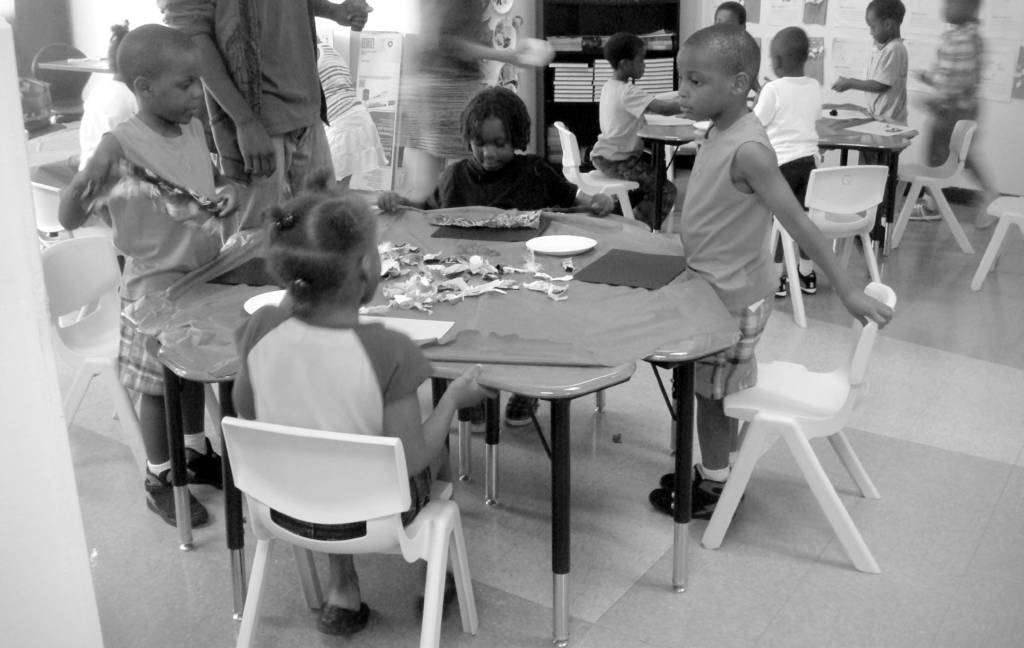For some of the city’s most underprivileged kids, a public library may be more than just a pleasant amenity. It can be an afterschool refuge, a vital link to learning, a lifeline. Yet more than a quarter of District children live in a neighborhood without a public library, according to DC Kids Count, a project of the Annie E. Casey Foundation.
The children growing up in the Wellington Park Apartment complex don’t have the luxury of a public library to call their own. Living in the stressed and crime-ridden neighborhood cluster of Buena Vista, Sheridan and Barry Farms in Anacostia, these kids are living in what is known to be the most dangerous neighborhood of a dangerous area. But Horton’s Kids is there to help.
This award-winning nonprofit is geared toward providing wrap-around services to meet the needs of children growing up in a community where single-parent families subsiding on less than $10,000 a year is the norm. Knowing that nutrition is a building block for learning, because of hunger’s detrimental effects on a child’s ability to focus and contribute, Horton’s offers breakfasts,lunches and snacks. It also operates a food pantry for families. Working with the Capital Area Food Bank, it sends students home with “weekend bags” which include 4 to 6 pounds of nutritious food, to ensure the children receive adequate nutrition during the two day break from school.
But the program’s main mission centers on building reading skills, said Kristin Frontiera, a development associate at Horton’s Kids. She said she believes there is nothing more important than building a solid foundation in literacy. “If a child is behind in reading in third grade,” she said, “he will never be able to catch up.” The literacy gap will remain for the rest of his life.
And so for Horton’s Kids in kindergarten through fourth grade, the goal is to work with the child to get them closer to or maintaining their ability to read at grade level.
When the school year ends and the kids are out for summer break, the push for literacy and learning becomes particularly urgent for low-income children. Studies have shown that children can lose up to one month of learning during summer vacation, with the impact falling the heaviest upon the poor. While middle-income children may be able to make some gains in a subject during the summer, low-income children can lose skills in the same area. A RAND study even concluded that “summer learning loss is cumulative and that, over time, these periods of differential learning rates between low-income and higher-income students contribute substantially to the achievement gap.”
The summer camp is not held at the Horton’s community center in Anacostia because the space cannot accommodate the large number of children enrolled. This year, it is being held at the Richard Wright Public Charter School for Journalism and Media Art, near the Navy Yard. Last year, it was held in a church in Anacostia. Frontiera explained that it is always a bit of a struggle to find a larger space for the summer, yet they always manage to do so, even if at the last minute.
Every day about 50 Wellington Park kids ride a bus to the charter school for this summer’s camp. They get four hours of educational activities, with sports and arts mixed in.
The children also receive breakfast, lunch and a snack for the bus ride home. A rising third-grader named Danielle, who has been part of Horton’s Kids since kindergarten, has nothing but praise for the program.
“My favorite thing to do is learn new stuff,” Danielle, whose favorite subjects are math and science, said. She is now going into the third grade at Savoy Elementary School and hopes to be a veterinarian one day. When asked what Horton’s Kids has helped her with the most, she explained that participation in the program has boosted her confidence.
“It’s helped me get over my fear of third grade,” she said, “Nobody is smarter than me in my class.” Fronteira points with pride to such signs of success.
Two of Horton’s Kids alumni are now college students, both with full-ride scholarships to their college. Both told her they had Horton’s Kids to thank for their success. And both remembered a field trip they had taken with the program. It was not to a water park or to a skating rink. It was to a public library, filled with books and other resources they were free to use. The wonder of that experience has stayed with them both, she said. Now they get help from the program in paying for their college textbooks.
“Once a Horton’s Kid, always a Horton’s Kid,” said Frontiera.








